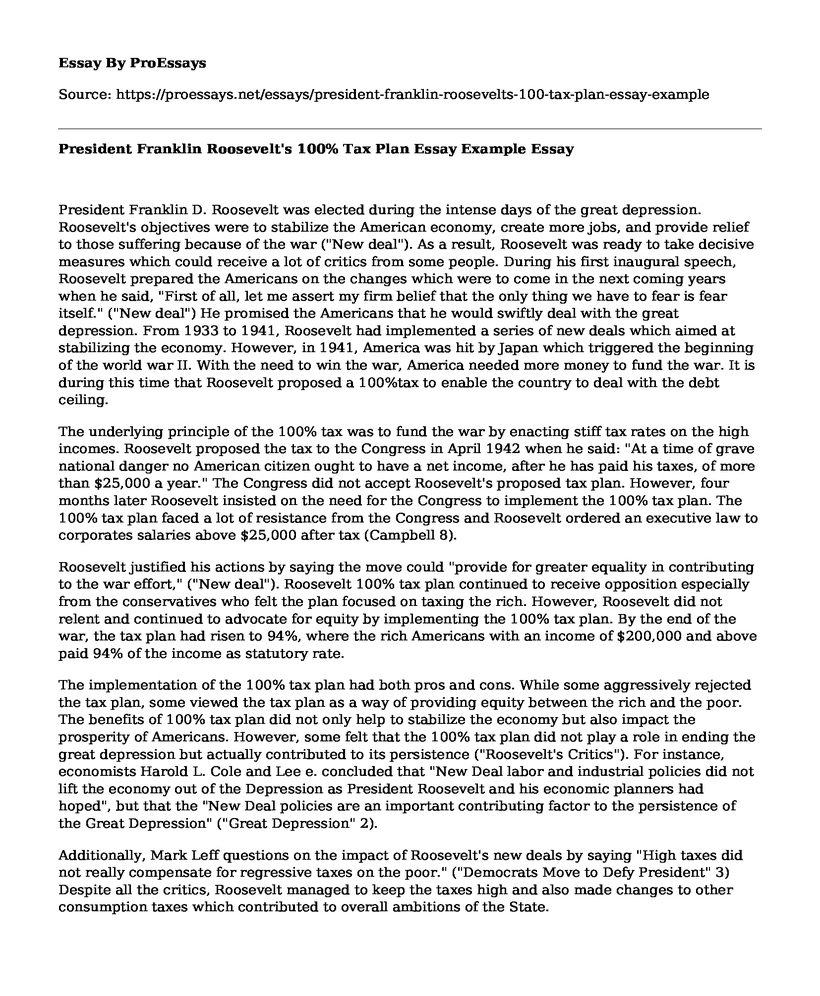President Franklin D. Roosevelt was elected during the intense days of the great depression. Roosevelt's objectives were to stabilize the American economy, create more jobs, and provide relief to those suffering because of the war ("New deal"). As a result, Roosevelt was ready to take decisive measures which could receive a lot of critics from some people. During his first inaugural speech, Roosevelt prepared the Americans on the changes which were to come in the next coming years when he said, "First of all, let me assert my firm belief that the only thing we have to fear is fear itself." ("New deal") He promised the Americans that he would swiftly deal with the great depression. From 1933 to 1941, Roosevelt had implemented a series of new deals which aimed at stabilizing the economy. However, in 1941, America was hit by Japan which triggered the beginning of the world war II. With the need to win the war, America needed more money to fund the war. It is during this time that Roosevelt proposed a 100%tax to enable the country to deal with the debt ceiling.
The underlying principle of the 100% tax was to fund the war by enacting stiff tax rates on the high incomes. Roosevelt proposed the tax to the Congress in April 1942 when he said: "At a time of grave national danger no American citizen ought to have a net income, after he has paid his taxes, of more than $25,000 a year." The Congress did not accept Roosevelt's proposed tax plan. However, four months later Roosevelt insisted on the need for the Congress to implement the 100% tax plan. The 100% tax plan faced a lot of resistance from the Congress and Roosevelt ordered an executive law to corporates salaries above $25,000 after tax (Campbell 8).
Roosevelt justified his actions by saying the move could "provide for greater equality in contributing to the war effort," ("New deal"). Roosevelt 100% tax plan continued to receive opposition especially from the conservatives who felt the plan focused on taxing the rich. However, Roosevelt did not relent and continued to advocate for equity by implementing the 100% tax plan. By the end of the war, the tax plan had risen to 94%, where the rich Americans with an income of $200,000 and above paid 94% of the income as statutory rate.
The implementation of the 100% tax plan had both pros and cons. While some aggressively rejected the tax plan, some viewed the tax plan as a way of providing equity between the rich and the poor. The benefits of 100% tax plan did not only help to stabilize the economy but also impact the prosperity of Americans. However, some felt that the 100% tax plan did not play a role in ending the great depression but actually contributed to its persistence ("Roosevelt's Critics"). For instance, economists Harold L. Cole and Lee e. concluded that "New Deal labor and industrial policies did not lift the economy out of the Depression as President Roosevelt and his economic planners had hoped", but that the "New Deal policies are an important contributing factor to the persistence of the Great Depression" ("Great Depression" 2).
Additionally, Mark Leff questions on the impact of Roosevelt's new deals by saying "High taxes did not really compensate for regressive taxes on the poor." ("Democrats Move to Defy President" 3) Despite all the critics, Roosevelt managed to keep the taxes high and also made changes to other consumption taxes which contributed to overall ambitions of the State.
Works Cited
Campbell, George W. "New Social Order." The Hartford Courant (1923-1993), Jan 14, 1944, pp. 8. ProQuest, https://search.proquest.com/docview/559887103?accountid=776.
"Democrats Move to Defy President on Charity Tax; He Assails 'Thrifty' Rich." New York Times (1923-Current file), Aug 01, 1935, pp. 1. ProQuest, https://search.proquest.com/docview/101408696?accountid=776.
"New Deal Did Not Ease the Great Depression." Savannah Morning News, Aug 10, 2011. ProQuest, https://search.proquest.com/docview/887418005?accountid=776.
"New Deal." History.com. 2018. Available at: https://www.history.com/topics/great-depression/new-deal
"Roosevelt's Critics." U.S History online Textbook. 2018.Available at: http://www.ushistory.org/us/49f.asp
Cite this page
President Franklin Roosevelt's 100% Tax Plan Essay Example. (2022, Oct 08). Retrieved from https://proessays.net/essays/president-franklin-roosevelts-100-tax-plan-essay-example
If you are the original author of this essay and no longer wish to have it published on the ProEssays website, please click below to request its removal:
- Research Paper on Dependence Between the Budget and Immigration in US
- Education Is the Secret Key: Essay Sample
- The Corrupt Bargain Essay Example
- Essay Example on American Conservation
- Essay Example on Comparing Plato's Cave to The Matrix: Reality and Perception
- US Victory in Spanish-American War: The Birth of an Empire - Essay Sample
- Essay on U.S. War on Drugs: Unsuccessful Campaigns, Drug Control, and Military Aid







